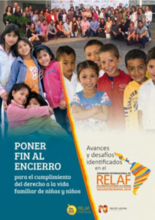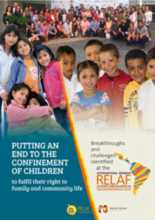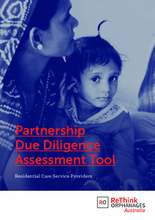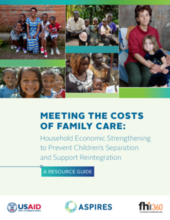Displaying 1811 - 1820 of 4424
This advocacy brief from SPOON Foundation notes that successful nutrition interventions are not reaching the children who are at highest risk, including children without family care and children with disabilities, and outlines four key actions that can help to ensure that children without family care and children with disabilities have opportunities to grow and thrive.
Este informe de RELAF resume las presentaciones y discusiones del Seminario Internacional 2019 de RELAF.
This report from RELAF summarizes the presentations and discussions from RELAF's 2019 International Seminar, "For the right to family and community life. Putting an end to the confinement of children deprived of parental care."
The Partner Due Diligence Assessment Tool was developed specifically for charities seeking to partner with overseas organisations who provide residential care services for children. It is designed to help you determine whether your partner or prospective partner is operating in accordance with standard notions of good practice and international norms.
This resource guide aims to assist program designers, funders, and implementers to select and incorporate appropriate and effective household economic strengthening (HES) measures into programs to preserve or reestablish family care for children.
These Case Management Minimum Indicators provide measurable benchmarks to assess the quality of case management in humanitarian crises.
The aim of this guide is to encourage a structured approach to developing Standard Operating Procedures for Child Protection Case Management in humanitarian settings.
In this coaching session, leaders involved in donor fundraising will discuss what's working to transition donors, troubleshoot challenges, and address questions in a small group format.
This article from ABC News highlights the growing calls in Australia for backpackers and young people traveling abroad "to rethink volunteering in developing countries as a booming trend of 'voluntourism' exposes a darker side of the industry."
In this blog post for Save the Children, Rebecca Smith, Senior Child Protection Adviser at Save the Children, writes about access to education (or lack thereof) as a driving force for the institutionalization of children around the globe.





